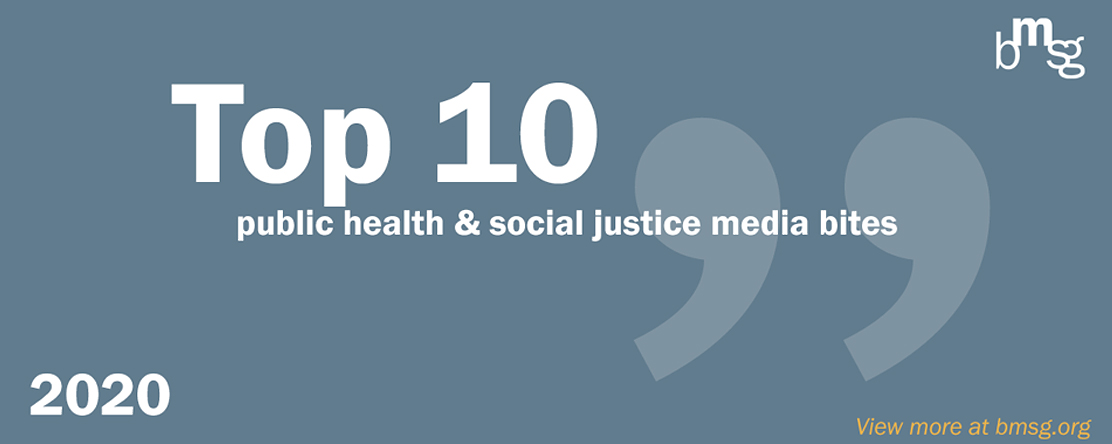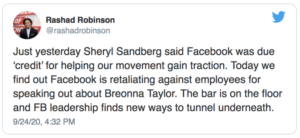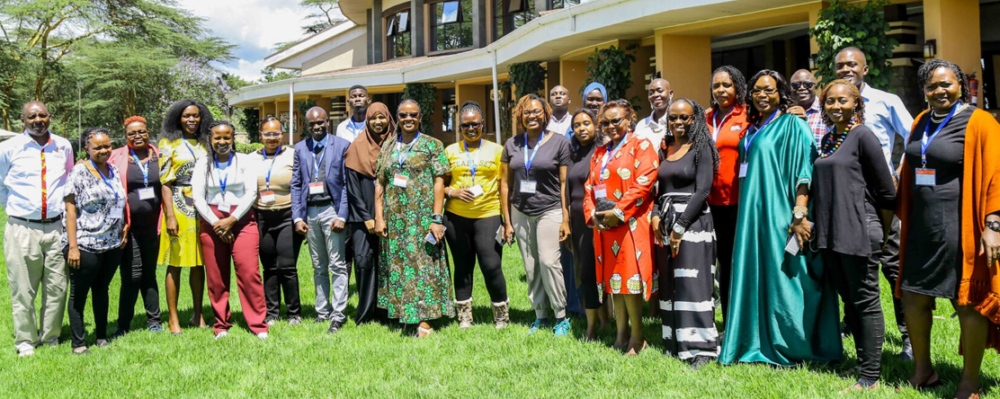
Update
Top 10 Public Health and Social Justice Media Bites of 2020
- Heather Gehlert
-
Programs
Berkeley Media Studies Group

During an interview prior to the launch of the Poor People’s Campaign more than 50 years ago, Martin Luther King, Jr., said, “There is nothing wrong with the traffic law which says you have to stop for the red light.” However, he clarified, “When a fire is raging, the fire truck goes right through that red light, and normal traffic had better get out [of] its way.”
So, when several women from the Moms 4 Housing collective occupied a vacant house in West Oakland late last year and leveraged public backlash against evictions to draw attention to the Bay Area’s housing crisis, “they constituted, in essence, an emergency response vehicle racing toward a burning fire,” stated an article from KQED.
In other words, normal rules don’t apply during emergencies. This is equally true for social emergencies — and 2020 has seen its share of crises. From the rise of a pandemic (made worse by existing racial and class inequities like homelessness), to the increased attention finally given to police violence and systemic racism, to the vociferous attacks on journalists trying to expose such issues, these emergencies have had people around the country running red lights at multiple intersections and grappling with how best to extinguish the fires.
One thing these issues have in common — besides their urgency and importance — is that none can be resolved without first painting a clear picture of what’s wrong, why it matters, and what can be done. To that end, advocates and organizers have been working tirelessly to sharpen their communication skills and make the case for solutions that advance equity and health. Those skills have shone through the many op-eds, letters to the editor, and other forms of media advocacy we have been tracking throughout the year.
As we compiled our annual Top 10 list of media bites, perhaps our most striking observation was that advocates regularly used metaphors, like the one above, and other creative comparisons to explain complex issues in simple but compelling terms. In fact, of our top picks this year, half of the quotes used this technique (and many other outstanding media bites made us seriously contemplate expanding the list!).
In a year when social division has frequently been palpable, we take comfort reading the words of those who are raising their voices in support of health, justice, and equity. And we are encouraged by the common threads that emerged in these media bites, painting a picture not only of outstanding communication but also of resilience and unity. As you wrap up this year, we hope you’ll enjoy our compilation of memorable media bites (presented in chronological order), and let us know which ones resonate most with you.
Top 10 Bites
The point driven home more than any other by a public health crisis with a highly contagious virus is that ultimately, we can be only as healthy as the least healthy people among us. If large swaths of the population can’t afford to take care of themselves, guess what — it matters to you, too.-Andy Slavitt, on the 10th anniversary of the Affordable Care Act, explaining why such legislation is so critical, especially in light of COVID-19. Appeared March 23, 2020 in USA Today.
Why we like it: When we work with public health advocates and community organizers who want to improve their messaging and media relations, we often encourage them to ground their words in values. Doing so makes messages more relatable on an emotional and visceral level. This media bite, which emphasizes the values of interconnection and equity, is an excellent example of this approach and is particularly salient amid the pandemic.
I’m sure I saved more lives keeping Georgia’s motorcycle law on the books than all the trauma resuscitations I did.-Dr. Arthur Kellermann, a former emergency room physician and public health researcher at Emory University in Atlanta. Appeared May 1, 2020 in NPR.
Why we like it: Talk about health, and many people will imagine its medical components: doctors, nurses, prescriptions — all of which are important in healing people who are sick. This media bite broadens the picture, illuminating the role of policy in protecting health. Rather than imagining wellness as a matter of intervention after an injury or illness, the physician speaking here reminds us that prevention is important on an even grander scale, despite the relatively little fanfare it receives.
Don’t be happy for me that I overcame these barriers. Be mad as hell that they exist in the first place.-Hazim Hardeman, a 2019 Rhodes scholar. Appeared May 12, 2020 in The New York Times.
Why we like it: Human interest stories are an important part of journalism because they put a name and face to statistics, allowing audiences to connect with issues that they may not observe or experience otherwise. However, when those stories zoom in too closely to spotlight an individual’s successes or difficulties, it can be hard for audiences to understand the social, political, or environmental context for such outcomes. In just a few words, this media bite pulls back the lens to focus on systems. In doing so, it challenges the reader to look not just at what it takes to overcome bad odds but on what it would take society to change those odds.
Making government more efficient is one thing. Putting it on life support is another.-Editorial board, Florida Times-Union. Reprinted May 13, 2020 in the Palm Beach Post.
Why we like it: Using a vivid metaphor, the editorial board behind this line acknowledges that government cannot function without proper resources. We only get back what we put into it. One way to ensure that government will fail us is to starve it of funds. It’s worth noting that those resources also must be sustained over time. As John Auerbach, who now leads the nonprofit Trust for America’s Health, said in similar vein in an article for The Washington Post, “One-time, emergency money is great, but it’s not how you hire the right people or get the right supplies for future crises. A forest fire is not the right time to start hiring firemen and buying firetrucks and equipment. It’s too late.”
For those of you who are tired of reading about racism, I’m tired of black and brown bodies being killed by it. I’m tired of watching some white people be more upset by those who are protesting racism as opposed to the racism itself.-LZ Granderson, columnist. Appeared May 28, 2020 in the Los Angeles Times.
Why we like it: When a person has privilege, they get to choose whether or not to engage with a particular issue. The video of George Floyd’s death at the hands of police punctured that bubble of privilege, forcing many people to grapple with racialized state violence even if they had previously been able to avoid it. Using a powerful juxtaposition, this columnist uncovers the irony — and injustice — of some white readers expressing exhaustion simply by hearing about such issues when people of color are living them day in and day out. To borrow from Martin Luther King, Jr.’s metaphor above, it would be like bystanders watching a house burn down and then scolding the driver of a fire truck for speeding through a traffic signal on its way to save lives.
Contact tracing is a vital public health protection. Opposing contact tracing is like telling the fire department you have the right to let your house burn down regardless of the risk to your neighbors.-Kat DeBurgh, executive director of the Health Officers Association of California. Appeared June 30, 2020 in the San Francisco Chronicle.
Why we like it: Though a strong analogy, this media bite demonstrates how interconnected our lives and health are, and it challenges common notions about freedom. Typically, freedoms are not absolute; they end the moment they infringe upon another person’s rights. This quote puts a fresh, timely spin on the old saying that my right to swing my fist ends when your nose begins. It also reminds us that freedom exists in two forms: freedom to and freedom from. Being protected from a fire hazard — or COVID infection — is an incredibly important but often overlooked type of freedom.
There is nothing ‘minty’ or ‘refreshing’ about the cycle of addiction, profit, and death Big Tobacco has wrought by pushing their poison in our communities. Now is the time for us to finally hold them accountable.Congresswoman Karen Bass, Chair of the Congressional Black Caucus. Appeared July 16, 2020 in The Sacramento Bee.
Why we like it: This media bite uses ironic language to expose the manipulation behind tobacco ads targeted at communities of color. It’s a powerful reminder that tobacco-related deaths are an expected, marketing-driven outcome — one that we can prevent by taking action against the tobacco industry.
A trustworthy press is the immune system of democracy.-Craig Newmark, founder of Craigslist. Appeared August 11, 2020 in Digiday.
Why we like it: Sometimes less is more. In this case, it only took nine words — and one strong metaphor — to get the point across.
For Black folks, it’s police kneeling on their necks. For a community like Sun Valley, it’s poisoning you slowly for 75 years.-Andres Ramirez, policy director of Pacoima Beautiful. Appeared September 23, 2020 in the Los Angeles Times.
Why we like it: The voice behind this media bite piggybacks off news about police violence to highlight another form of systemic racism: policy violence. By using an analogy, the quote brings the issue out of the abstract and makes it tangible, showing that elected officials and regulators can make decisions that harm and even kill people without ever laying a hand on them. This is not the first time we’ve seen writers reference George Floyd’s murder to make other forms of discrimination visible. For example, Andre Perry, the author of Know Your Price: Valuing Black Lives and Property in America’s Black Cities, explained in The New York Times that the “choking out” of people of color also occurs in real estate through “very low appraisals.”
Powerful people like to point out that COVID-19 does not discriminate. Indeed, the rain, too, does not discriminate against those it falls on. But one’s ability to stay dry beneath a downpour is dependent on the availability of an umbrella. Similarly, our access to security in a pandemic depends on the safety net of the state. Umbrellas can be shared or withheld. Those without one can be listened to — or ignored.-Ciaran Thapar. Appeared Nov. 2, 2020 in The Guardian.
Why we like it: This analogy shows that human agency exists behind the disparate COVID-related health outcomes that we are seeing. The author challenges the status quo and demonstrates that it is not neutral; rather, it is the result of active decision-making. With those decisions in the spotlight, we can push for more equitable ways to protect communities of color and others who are at disproportionately high risks of contracting, getting sick, and dying from the novel coronavirus.
Social media bite of the year
The bar is on the floor and FB [Facebook] leadership finds new ways to tunnel underneath.-Rashad Robinson, executive director, Color of Change. Appeared September 24, 2020 on Twitter.
 Why we like it: Writing op-eds and being quoted in the news media aren’t the only ways for advocates to shape public conversation on issues of health and social justice. In this tweet, Rashad Robinson makes a powerful point directly to readers, without going through the filter of a publisher — and speaks directly to Facebook at the same time. He uses a metaphor that conjures a vivid mental picture, leaving no doubt about how problematic Facebook leadership has been when it comes to issues of racial equity.
Why we like it: Writing op-eds and being quoted in the news media aren’t the only ways for advocates to shape public conversation on issues of health and social justice. In this tweet, Rashad Robinson makes a powerful point directly to readers, without going through the filter of a publisher — and speaks directly to Facebook at the same time. He uses a metaphor that conjures a vivid mental picture, leaving no doubt about how problematic Facebook leadership has been when it comes to issues of racial equity.
Originally published by Berkeley Media Studies Group
More Updates
Work With Us
You change the world. We do the rest. Explore fiscal sponsorship at PHI.
Support Us
Together, we can accelerate our response to public health’s most critical issues.
Find Employment
Begin your career at the Public Health Institute.



